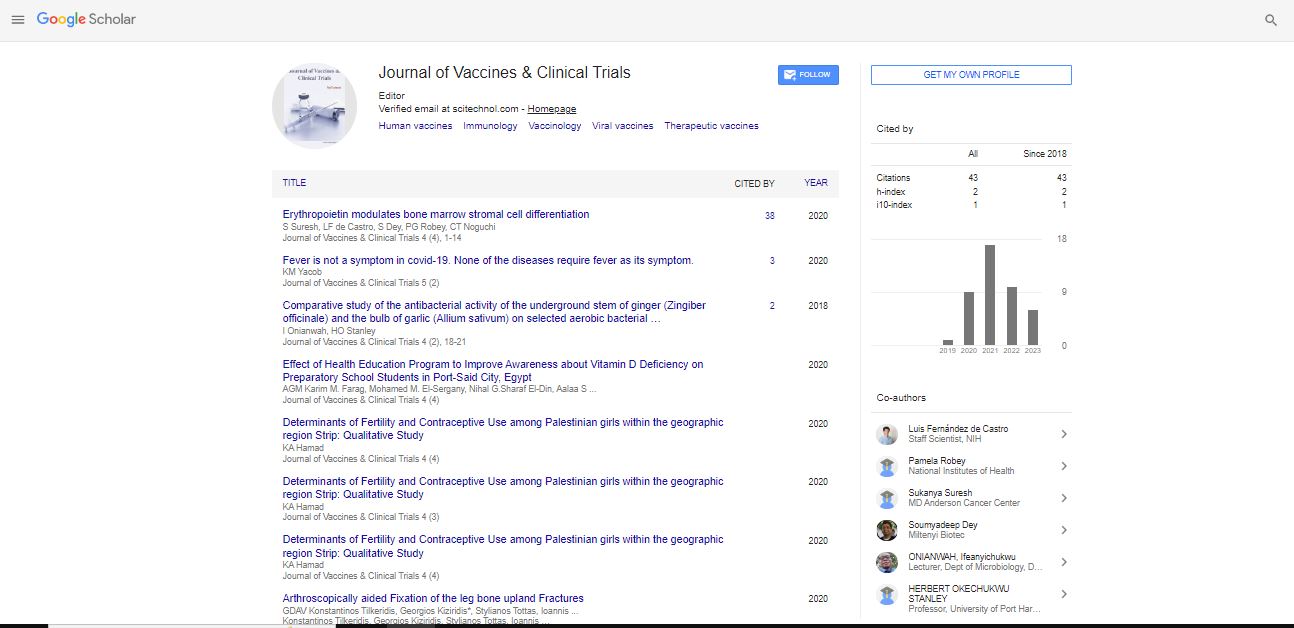Perspective, Jou Of Vac Cli Tr Vol: 7 Issue: 2
Guillain-Barré Syndrome (GBS) and COVID-19 Vaccination in Individuals Aged 50 and Above
Qingbin Chong*
1Department of Laboratorial Science and Technology, School of Public Health, Peking University, Beijing, China
*Corresponding Author: Qingbin Chong,
Department of Laboratorial Science and
Technology, School of Public Health, Peking University, Beijing, China
E-mail: chongbin007@hotmail.com
Received date: 29 May, 2023, Manuscript No. JVCT-23-102777;
Editor assigned date: 31 May, 2023, PreQC No. JVCT-23-102777(PQ);
Reviewed date: 14 June, 2023, QCNo JVCT-23-102777;
Revised date: 21 June, 2023, Manuscript No. JVCT-23-102777(R);
Published date: 28 June, 2023, DOI: 10.4172/JVCT.100079
Citation: Chong Q (2023) Guillain-Barré Syndrome (GBS) and COVID-19 Vaccination in Individuals Aged 50 and Above. Jou of Vac Cli Tr 7:2.
Keywords: Qingbin Chong*
Description
Guillain-Barré Syndrome (GBS) is a rare neurological disorder that has been associated with various viral infections and, in some instances, with vaccinations. As COVID-19 vaccination efforts have expanded globally, concerns have emerged regarding a potential link between certain COVID-19 vaccines and GBS, particularly in individuals aged 50 and above. This study aims to explore the relationship between GBS and COVID-19 vaccination in this specific age group. Current evidence suggests a potential, albeit rare, association between certain COVID-19 vaccines and GBS. Understanding the available data, assessing risk-benefit ratios, and implementing appropriate surveillance systems are crucial for informed decision-making and maintaining public trust in vaccination programs.
Guillain-Barré Syndrome (GBS) is a rare neurological disorder characterized by muscle weakness, tingling sensations, and in severe cases, paralysis. Concerns have arisen regarding the potential association between GBS and COVID-19 vaccination, particularly in individuals aged 50 and above. This manuscript aims to explore the available evidence on GBS following COVID-19 vaccination in this specific age group.
However, available data suggests that the risk of GBS following COVID-19 vaccination is extremely low. The benefits of COVID-19 vaccination in preventing severe illness, hospitalization, and death outweigh the minimal risk of GBS. Regulatory agencies closely monitor vaccine safety and continue to recommend vaccination for all eligible individuals, including those in the 50 and above age group, to protect against COVID-19 and its potentially severe consequences.
Guillain-Barré syndrome
GBS is an autoimmune disorder that affects the peripheral nervous system. It is often preceded by a viral or bacterial infection, where the immune response mistakenly targets the nerves. GBS typically presents with weakness, loss of sensation, and, in severe cases, respiratory or swallowing difficulties.
GBS and vaccinations
GBS has been linked to various vaccines, although the risk is generally low. The association between GBS and vaccines is thought to be immune-mediated, triggered by the body's immune response to the vaccine or the underlying infection.
GBS following COVID-19 vaccination
Reports of GBS cases following COVID-19 vaccination have been documented, albeit rarely. Several COVID-19 vaccines, such as the Johnson and Johnson and AstraZeneca vaccines have shown a potential association with GBS. The risk appears to be higher in older age groups, particularly those aged 50 and above.
Risk-benefit analysis
When assessing the risk-benefit profile, it is important to consider the rarity of GBS cases following COVID-19 vaccination compared to the potential benefits of vaccination, such as preventing severe COVID-19 disease and its complications. The overall risk of developing GBS after COVID-19 vaccination remains extremely low.
Vaccine surveillance and monitoring
Surveillance systems are in place to detect and monitor adverse events following COVID-19 vaccination, including GBS. These systems enable the identification of any potential signals and allow for prompt investigation and risk assessment.
Communication and public trust
Transparent and timely communication about the potential risks and benefits of COVID-19 vaccination is crucial in maintaining public trust. Healthcare providers should provide accurate information, address concerns, and discuss individual risk profiles with patients, especially in the older age group.
Conclusion
While a potential association between GBS and certain COVID-19 vaccines has been identified, the risk remains rare and must be balanced against the benefits of vaccination, particularly for individuals aged 50 and above. Continued surveillance and research efforts are essential for monitoring vaccine safety and ensuring informed decision-making.
 Spanish
Spanish  Chinese
Chinese  Russian
Russian  German
German  French
French  Japanese
Japanese  Portuguese
Portuguese  Hindi
Hindi 